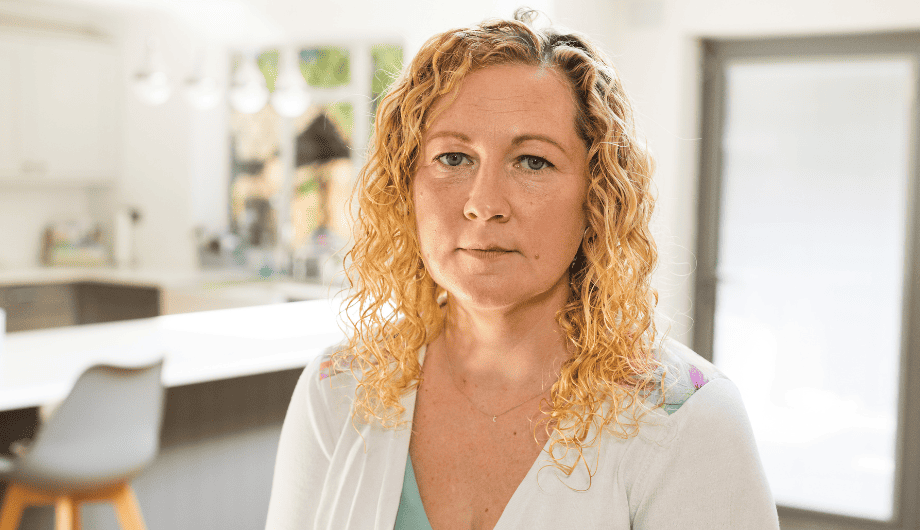
Saïna’s story – A song for my beloved grandpa, Ralph
Saïna opens up about how her grandfather’s dementia has affected her, and how songwriting has provided a release.
When a person with dementia is nearing the end of life, compassionate care is essential for their comfort and dignity. Our dementia specialist Admiral Nurses share their advice on recognising this difficult stage and supporting the person you care for.
Dementia is a progressive neurological condition which is life-limiting – although many people with dementia may die as a result of other conditions (such as cancer or heart failure) before they reach its later stages.
Whether a person has dementia alone or other health conditions alongside, it’s important that plans are made to ensure they receive good end of life care. This can include a shift from treatments that may cause distress or have limited benefit, and more towards a focus on comfort care.
The end of life stage can be hard to identify and accept. However, good end of life care can enhance the person’s quality of life and ensure their needs are met, while also easing distress for family and friends. This can include a shift from treatments that may cause distress or have limited benefit, and more towards a focus on keeping them comfortable.
The end of life stage could last days, weeks, months or even a year or more. It is often difficult to predict, so it is better to focus on the person’s needs rather than on how long they may have left to live.
Signs that a person with dementia might be approaching the end of their life include:
If the person with dementia is showing a number of these signs or you have any concerns, consult their GP – there may be a cause that could be treated, such as pain or delirium.
If the person with dementia is nearing the end of life, it is important to think about how their care should be provided. This will help ensure their needs are met, bring a sense of calm to emotional situations and prevent having to make decisions in a crisis.
This may include:
Your GP may be able to help with making these plans, or you can call the Admiral Nurse Dementia Helpline for advice – please see Sources of support, below.
If possible, the person should be fully involved in making decisions about their future. If they no longer have the mental capacity to do so, other people may need to make these decisions on their behalf, in their best interests.
Decisions to think about include:
Resuscitation
Resuscitation is often unsuccessful for someone who is in the advanced stages of dementia and can cause distress and trauma. For this reason, a decision may be made that resuscitation should not be attempted at this stage (known as ‘do not attempt CPR’, or DNACPR).
The NHS has more information to help you decide whether or not resuscitation is appropriate.
Eating and drinking
At the end of life, people may have a reduced appetite or not want to eat and drink at all. This is a natural part of the dying process.
Invasive interventions like feeding through a tube or drip are unlikely to extend the person’s life or improve their quality of life, and may cause distress.
Instead, you and the person’s care team might focus on giving them food and drink for comfort and enjoyment, rather than nutrition. For example:
You could also request a referral to a speech and language therapist for advice, especially if the person has difficulty swallowing.
Infections
Frequent infections are common in the end stages of life, especially chest infections, pneumonia and urinary tract infections (UTIs).
It is important to consult the person’s GP if they are showing signs of infection.
If the person can still swallow, they may be prescribed antibiotics to take by mouth. However, the GP may feel that antibiotics are not appropriate – for example if the person cannot swallow and would need a drip – and prescribe other medication that could be given by injection to keep them comfortable.
Frailty, mobility and falls
As dementia advances, many people become increasingly frail and experience mobility problems and falls.
You and the person’s health/social care professionals may want to discuss whether it is right for them to be admitted to hospital if they fall. For example, serious injuries may need hospital treatment, but otherwise, it may be possible to support them at home or in their care home.
Becoming more frail and less mobile may lead to other health problems – for example, if the person spends long periods in a chair, they may develop constipation or pressure sores. You could request a referral to a district nurse for help managing these.
An important consideration is where the person will be cared for at the end of life, and the best place for them to die.
Many people will need 24-hour care at this stage, so if you and the person with dementia want them to remain at home, professional home carers may be helpful.
As the person’s care needs increase, you may want to consider a move into a care home. This can be a difficult decision, but with their practical needs taken care of, you can focus on spending time together.
If there is a palliative care or hospice team in your area, they may be able to support the person – either at home, with help from specialist nurses to manage their symptoms and keep them comfortable, or in the hospice itself.
Your GP can advise you about local hospices and palliative care provision.
It is important that the person with dementia feels loved, safe and secure at the end of life. You could try:
It is important that the person’s faith, spiritual beliefs and cultural considerations are respected at the end of life. For example:
You could include this information in their care plan or life story.
Most of the advice around end of life care also applies to people with young onset dementia (where symptoms develop before the age of 65) – for example, it is still important to consider issues like Advance Care Planning and resuscitation, even if the person appears to be in better physical health and less frail than an older person.
However, there are often additional issues to think about, such as:
It is important that the person with young onset dementia and their family have professional support towards the end of life. Please see Sources of support, below, for information on accessing support and advice.
As the carer of a person at the end of life, you need to look after your own needs. You may wish to seek support from:
You can also speak to our dementia specialist Admiral Nurses about any aspect of dementia: call our free Dementia Helpline on 0800 888 6678 (Monday-Friday 9am-9pm, Saturday and Sunday 9am-5pm), email helpline@dementiauk.org or book a virtual appointment via phone or video call.
Dementia UK resources
Good hydration for a person with dementia
Looking after yourself as a carer
Mental capacity and decision-making
Supporting children and adolescents with a parent with young onset dementia
Supporting children and adolescents with grief, bereavement and loss
Young onset dementia: choosing a care home
Other resources
Compassion in Dying: living Will advice
Hospice UK: the national charity for those experiencing dying, death and bereavement
Marie Curie: care and support through terminal illness
My Decisions: help with planning future care and recording wishes
Resuscitation Council UK ReSPECT plan for emergency care and CPR
Thanks for downloading! We’re only asking for your email so we can measure downloads and ask for your feedback. We won’t sign you up for any marketing communications, but if you'd like to stay in touch, sign up for our newsletter by clicking "Subscribe to our newsletter" at the bottom of this page.
Our virtual clinics give you the chance to discuss any questions or concerns with a dementia specialist Admiral Nurse by phone or video call, at a time that suits you.

Saïna opens up about how her grandfather’s dementia has affected her, and how songwriting has provided a release.

Ricky’s talks about how his Gran’s dementia diagnosis impacts his whole family and why he is supporting the ‘We live with dementia’ campaign.

As a carer for her mum, who has vascular dementia, Clare is taking part in our ‘We live with dementia’ campaign to make more people aware of the support our nurses offer.